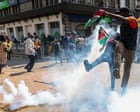
In recent days, the world has encountered a myriad of significant events that invite us to reflect calmly on the human condition, societal challenges, and the paths towards healing and growth. As global citizens, it is essential to engage with these narratives mindfully, understanding their complexities and the broader contexts in which they unfold.
In Kenya, a nationwide demonstration was held to honor the memory of those who lost their lives in anti-government protests the previous year. The day, imbued with emotional significance, experienced tension as it converged with the anniversary of a symbolic event—the storming of parliament by those same protesters. Despite efforts to maintain peace, these marches were marked by clashes between law enforcement and civilians, resulting in at least 16 fatalities and numerous injuries. The day was intended to be a solemn remembrance, yet underlying fears of unrest manifested as discord.
Rights activists, family members, and other citizens, united by their call for justice, diligently organized both online and offline gatherings. Opposition leaders joined in recognizing the day as a “people’s public holiday.” However, the government’s warnings against disruptions underscored the fragility of the peace. Such events remind us of the importance of dialogue and reconciliation as avenues for societal healing and highlight the need for respecting varied narratives within communities.
In a poignant incident affecting the global community, the World Health Organization reported a tragic attack on a hospital in Sudan, resulting in the loss of over 40 lives, including health workers and children. This grievous event underscores the challenges faced in regions plagued by long-standing conflicts. The civil war in Sudan continues to exacerbate a large-scale humanitarian crisis, necessitating urgent international attention and efforts towards sustainable peace and rebuilding.
Across the Atlantic, a significant policy proposal has surfaced, evoking deep concern among the scientific and medical communities. The proposed $2.7 billion funding cut to the National Cancer Institute by the U.S. administration has stirred fears of substantial setbacks in cancer research and treatment development. This decision carries profound implications, as the NCI is a pivotal organization in the fight against cancer. Throughout history, investment in scientific research has illuminated pathways to understanding and combating complex diseases, emphasizing the criticality of sustained funding in advancing public health goals.
Meanwhile, within the United States, an event marked by its somber yet resolute finality occurred with the execution of Richard Gerald Jordan, Mississippi’s longest-serving death row inmate. Jordan was sentenced nearly five decades ago, and his story is punctuated with layers of historical and personal complexity. This moment invites reflection on the broader conversations regarding criminal justice, rehabilitation, and the enduring impact of past actions.
As we absorb these events, let us center our reflections on the human elements that bind us—compassion, justice, and the shared pursuit of a more harmonious world. Through mindful engagement, we can better empathize with those affected, advocate for just solutions, and participate thoughtfully in dialogues that shape our present and future. In this tapestry of global events, each narrative carries with it lessons and opportunities for collective growth.
Source: {link}
